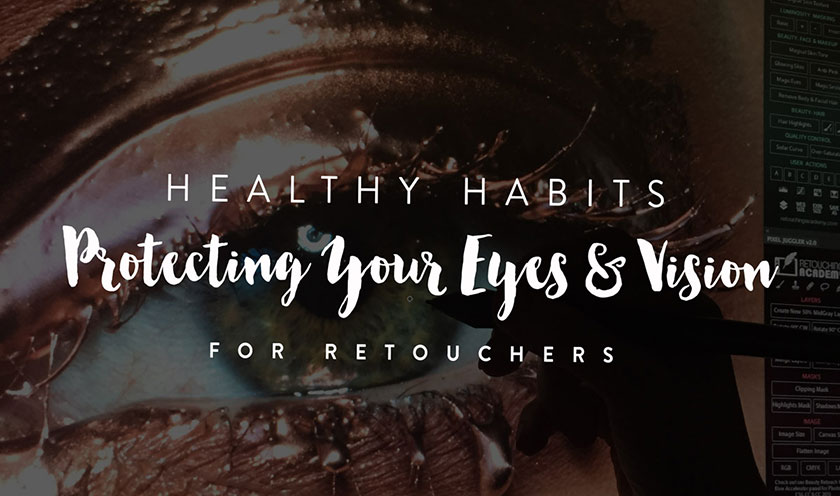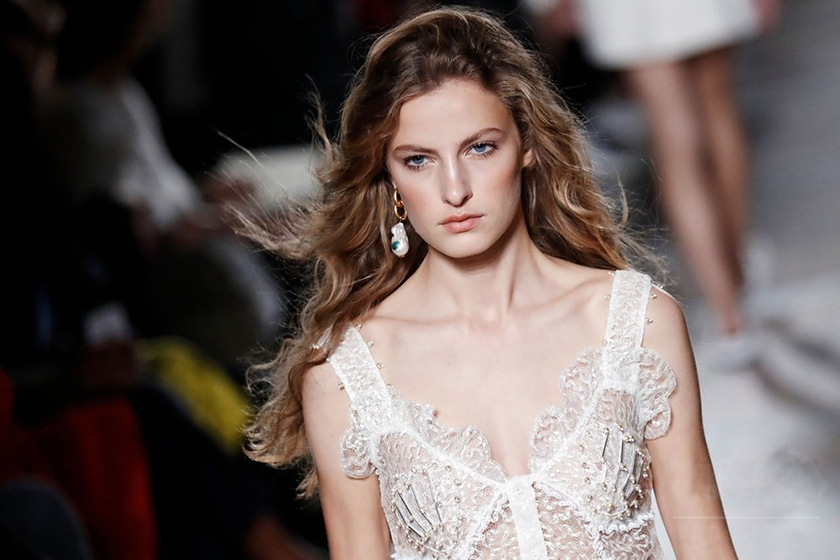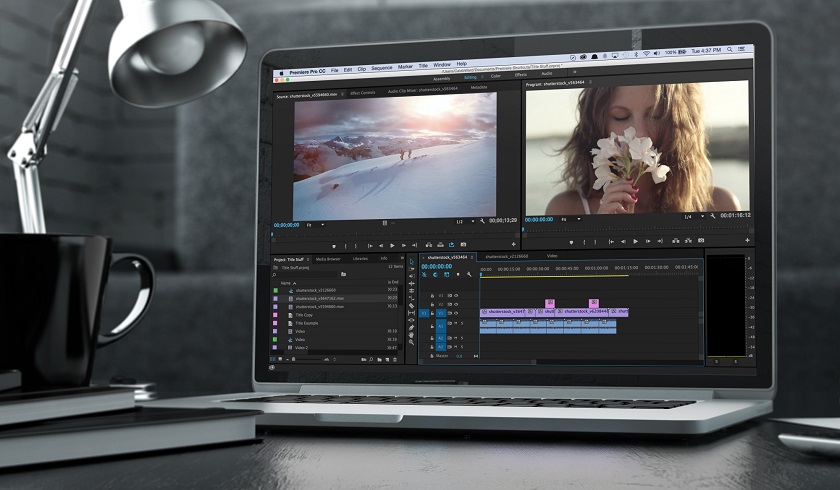Best Selling Products
CVS Documentary Magazine bans my edited images
Nội dung
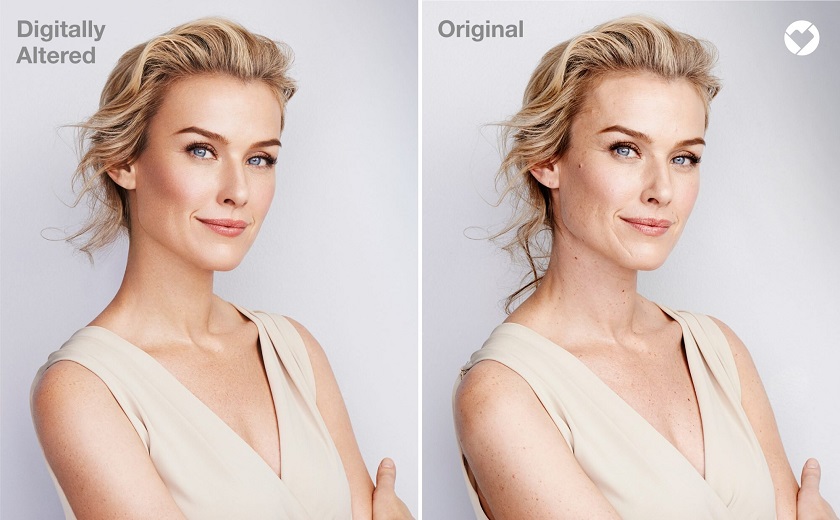
Yesterday, countless news websites announced that CVS, one of the largest drugstores in the US, had announced a ban on image manipulation in makeup marketing created to display in-store advertising, website, social media and any other marketing materials.  Independent.co.uk's Chelsea Ritschel said: "This is huge,"Consumers have made it clear they no longer want to see photoshopped or photo-edited ads - and brands are finally listening. to listen ". Announcing the change, CVS Pharmacy President Helena Foulkes said: “As a woman, mother and president of a retail business with a predominantly female clientele, I realize that we are responsible for thinking about the messages we send to the customers we reach on a daily basis… The link between the propaganda of unrealistic body images and negative health effects, especially especially in children and young women, has been established. As a purpose-driven company, we do our best to ensure that all the messages we are sending to our customers reflect our purpose of helping people on their way to better health”. Ritschel continued: “To achieve this, the drugstore company announced a ban on photo manipulation for makeup marketing and advertising display in stores, websites, media, etc. social media and any marketing materials”. cvs
Independent.co.uk's Chelsea Ritschel said: "This is huge,"Consumers have made it clear they no longer want to see photoshopped or photo-edited ads - and brands are finally listening. to listen ". Announcing the change, CVS Pharmacy President Helena Foulkes said: “As a woman, mother and president of a retail business with a predominantly female clientele, I realize that we are responsible for thinking about the messages we send to the customers we reach on a daily basis… The link between the propaganda of unrealistic body images and negative health effects, especially especially in children and young women, has been established. As a purpose-driven company, we do our best to ensure that all the messages we are sending to our customers reflect our purpose of helping people on their way to better health”. Ritschel continued: “To achieve this, the drugstore company announced a ban on photo manipulation for makeup marketing and advertising display in stores, websites, media, etc. social media and any marketing materials”. cvs 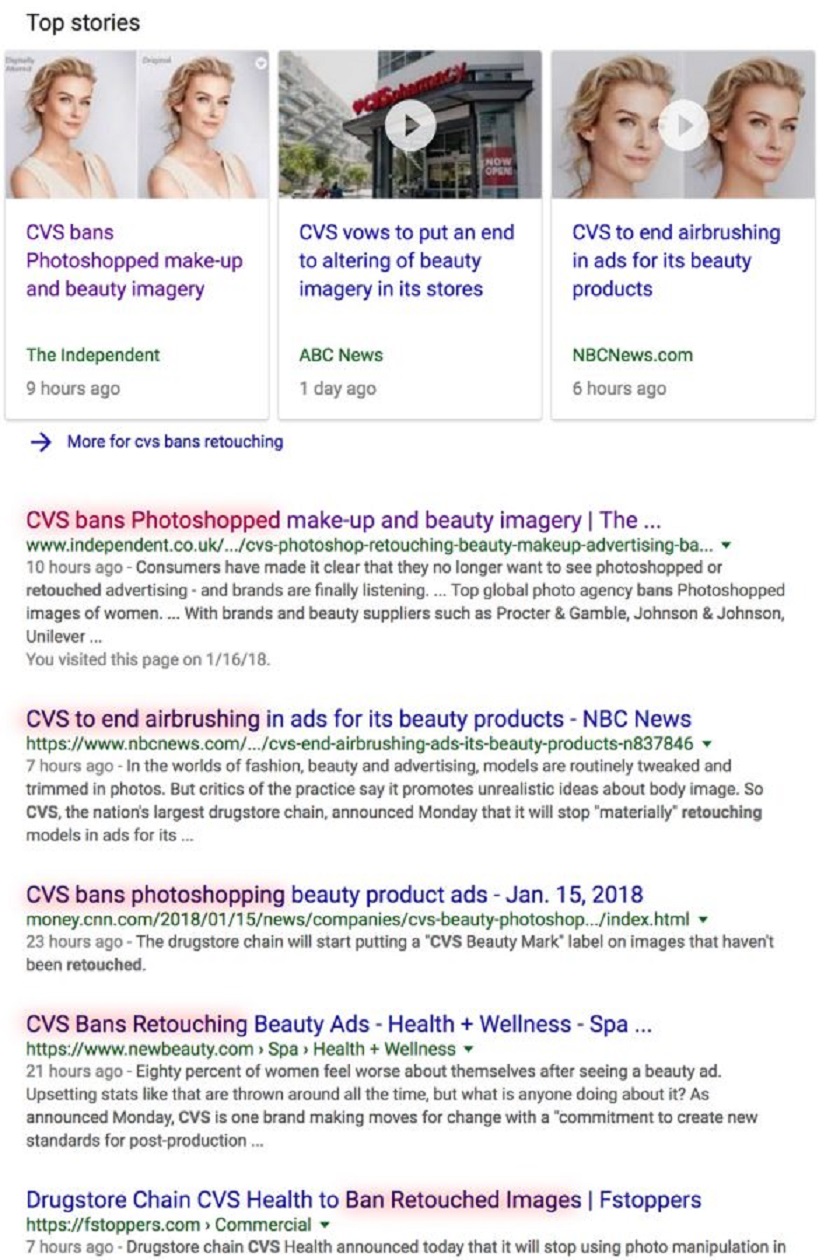 It's a great initiative, but do consumers really understand what they're asking for? I have been photographing women of all ages, colors and backgrounds around the world for over 10 years. I have photographed actresses, models, writers, mothers and just ordinary women and I have yet to meet a woman who can look at the original images and say, “I want to show The whole world sees what I really look like - please don't edit! ” Not because my out-of-camera images look bad, but because the studio lights, large sensor cameras, and sharp lenses are cruel to women's faces. Over the past few years, I've worked with dozens of cosmetic brands large and small to create their promotional images, and it's relatively rare for a client to ask me to retouch the image to perfection. My own approach is to edit as much as necessary to revert the model's captured look to what I actually saw with my own eyes at the time of the shoot. But if the client asks for a push, it's my duty to do so, although I always try to explain why more editing isn't a great idea. For the same reason, I am very picky about the skill level of the makeup artist I work with on my beauty campaigns and the quality of the skin of the models chosen for the photo shoot. If the face and skin are prepared for the shoot by a qualified creative team, well lit and captured - there won't be too much retouching, this will allow the image to be kept as authentic as the studio lights. bright and sharp lens allows.
It's a great initiative, but do consumers really understand what they're asking for? I have been photographing women of all ages, colors and backgrounds around the world for over 10 years. I have photographed actresses, models, writers, mothers and just ordinary women and I have yet to meet a woman who can look at the original images and say, “I want to show The whole world sees what I really look like - please don't edit! ” Not because my out-of-camera images look bad, but because the studio lights, large sensor cameras, and sharp lenses are cruel to women's faces. Over the past few years, I've worked with dozens of cosmetic brands large and small to create their promotional images, and it's relatively rare for a client to ask me to retouch the image to perfection. My own approach is to edit as much as necessary to revert the model's captured look to what I actually saw with my own eyes at the time of the shoot. But if the client asks for a push, it's my duty to do so, although I always try to explain why more editing isn't a great idea. For the same reason, I am very picky about the skill level of the makeup artist I work with on my beauty campaigns and the quality of the skin of the models chosen for the photo shoot. If the face and skin are prepared for the shoot by a qualified creative team, well lit and captured - there won't be too much retouching, this will allow the image to be kept as authentic as the studio lights. bright and sharp lens allows. 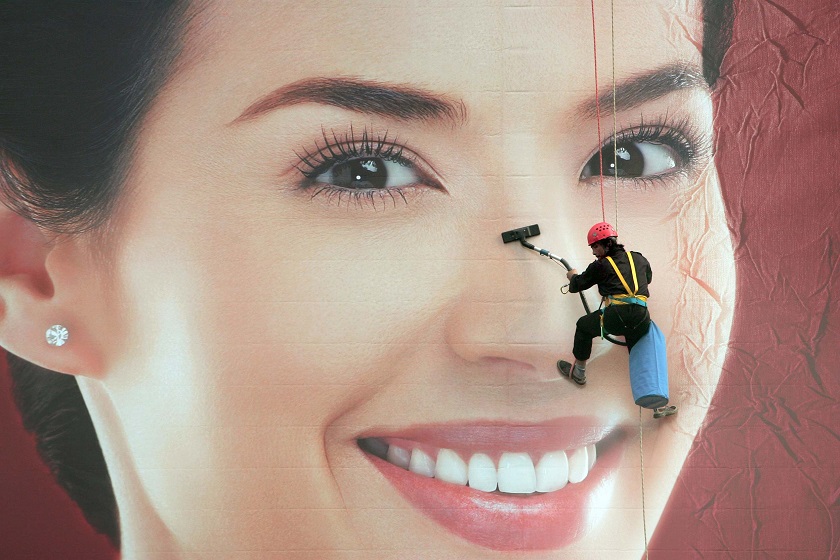 I'm not always so careful; It took me years of practice to perfect my work. And now with my mature artistic vision, I can see that a large number of advertising images in the beauty industry are not edited by professional retouchers with the same careful approach. self and desire to maintain the model's authentic appearance. So let me just go out there and say it - the problem is NOT retouching in the beauty industry; the problem is with unproven photography and retouching used by some cosmetic brands. If you think about it, CVS's plan for new post-production standards and their goal of good image transparency is good news for the industry as it helps draw attention to the issue. However, the situation still worries me about the future of the beauty industry image as there are a lot of moving parts and some of them are not clickable and that has led to the words called for drastic measures such as a complete ban on editing. As a professional directly involved in the industry, I believe this is how we got to this point in terms of editing: Editing isn't bad, unproven editing makes a bad name for all editors; Buying a digital camera and downloading Photoshop is now so affordable that a large number of people call themselves professional photographers and retouchers, but this is no more true if someone buys it. a violin and calling herself a concert violinist - it is the responsibility of the beauty brand to hire qualified professionals to create their promotional materials; Marketing professionals in some cosmetic companies often don't have a clear understanding of the quality of photography and retouching, which leads them to hire photographers and retouchers based on their budget, regardless of budget. the artist's skill level; Over-edited images requested and approved by marketing experts are being released to the world and causing consumers to blame Photoshop and photo retouchers for “spreading inappropriate body images.” reality and negatively affect the health of girls and women”. There isn't a single element in the image creation process to blame - it's not Photoshop, and it's certainly not all retouchers, and it's not really about quality retouching either. quantity. As the founder of the Retouching Academy, I believe we desperately need a place where companies can go and recruit RECOGNIZED beauty retouching professionals. Our professional editing program is under development as we speak, and we will soon welcome anyone who needs the help of an experienced and skilled professional retouching expert to find someone. it's right here on our website. Being able to work with professional retouchers will not only save your retouching reputation, but will also help keep the beauty industry's image in tip-top shape.
I'm not always so careful; It took me years of practice to perfect my work. And now with my mature artistic vision, I can see that a large number of advertising images in the beauty industry are not edited by professional retouchers with the same careful approach. self and desire to maintain the model's authentic appearance. So let me just go out there and say it - the problem is NOT retouching in the beauty industry; the problem is with unproven photography and retouching used by some cosmetic brands. If you think about it, CVS's plan for new post-production standards and their goal of good image transparency is good news for the industry as it helps draw attention to the issue. However, the situation still worries me about the future of the beauty industry image as there are a lot of moving parts and some of them are not clickable and that has led to the words called for drastic measures such as a complete ban on editing. As a professional directly involved in the industry, I believe this is how we got to this point in terms of editing: Editing isn't bad, unproven editing makes a bad name for all editors; Buying a digital camera and downloading Photoshop is now so affordable that a large number of people call themselves professional photographers and retouchers, but this is no more true if someone buys it. a violin and calling herself a concert violinist - it is the responsibility of the beauty brand to hire qualified professionals to create their promotional materials; Marketing professionals in some cosmetic companies often don't have a clear understanding of the quality of photography and retouching, which leads them to hire photographers and retouchers based on their budget, regardless of budget. the artist's skill level; Over-edited images requested and approved by marketing experts are being released to the world and causing consumers to blame Photoshop and photo retouchers for “spreading inappropriate body images.” reality and negatively affect the health of girls and women”. There isn't a single element in the image creation process to blame - it's not Photoshop, and it's certainly not all retouchers, and it's not really about quality retouching either. quantity. As the founder of the Retouching Academy, I believe we desperately need a place where companies can go and recruit RECOGNIZED beauty retouching professionals. Our professional editing program is under development as we speak, and we will soon welcome anyone who needs the help of an experienced and skilled professional retouching expert to find someone. it's right here on our website. Being able to work with professional retouchers will not only save your retouching reputation, but will also help keep the beauty industry's image in tip-top shape.
 Independent.co.uk's Chelsea Ritschel said: "This is huge,"Consumers have made it clear they no longer want to see photoshopped or photo-edited ads - and brands are finally listening. to listen ". Announcing the change, CVS Pharmacy President Helena Foulkes said: “As a woman, mother and president of a retail business with a predominantly female clientele, I realize that we are responsible for thinking about the messages we send to the customers we reach on a daily basis… The link between the propaganda of unrealistic body images and negative health effects, especially especially in children and young women, has been established. As a purpose-driven company, we do our best to ensure that all the messages we are sending to our customers reflect our purpose of helping people on their way to better health”. Ritschel continued: “To achieve this, the drugstore company announced a ban on photo manipulation for makeup marketing and advertising display in stores, websites, media, etc. social media and any marketing materials”. cvs
Independent.co.uk's Chelsea Ritschel said: "This is huge,"Consumers have made it clear they no longer want to see photoshopped or photo-edited ads - and brands are finally listening. to listen ". Announcing the change, CVS Pharmacy President Helena Foulkes said: “As a woman, mother and president of a retail business with a predominantly female clientele, I realize that we are responsible for thinking about the messages we send to the customers we reach on a daily basis… The link between the propaganda of unrealistic body images and negative health effects, especially especially in children and young women, has been established. As a purpose-driven company, we do our best to ensure that all the messages we are sending to our customers reflect our purpose of helping people on their way to better health”. Ritschel continued: “To achieve this, the drugstore company announced a ban on photo manipulation for makeup marketing and advertising display in stores, websites, media, etc. social media and any marketing materials”. cvs But is this really a retouching ban?
The full CVS statement is available here: CVS Pharmacy Committed to Creating New Standards for Transforming Post-production Beautiful images. The press release states: “[CVS] has announced a commitment to creating new standards for post-production change of the beautiful images it generates for stores, websites, social media and any marketing materials…. The company also announced that it will be introducing the “CVS Beauty Mark,” “a watermark that will be used to highlight images that have not been physically altered.” The notice goes on to define a material change to mean any image that changes or enhances “a person's shape, size, proportions, skin or eye color, wrinkles, or any other personal feature.” any other". Honestly, this has nothing to do with banning the edit, a point that has clearly been lost amid the frenzied reports. The aim here is to help consumers know when they are viewing authentic images rather than digitally altered or enhanced images - that is, images that depict an unrealistic representation of the product. described person. “CVS Beauty Mark will start appearing on beauty images produced by CVS Pharmacy in 2018 with the goal that all images in the beauty sections of CVS Pharmacy stores reflect transparency by the end of 2020.”Where do news reporters get their news?
As a commercial beauty photographer and retoucher this is an important announcement for me, my colleagues and my profession, after seeing and scouring the headlines I have moved straight to source material - actual CVS press release. Yes, English is not my native language, so maybe I missed something. After all, how did so many news outlets include this notice as an outright ban on editing? I have re-read the notice several times and there is no claim that CVS prohibits editing. Which leaves me with a slightly unrelated question: do newspaper reporters still fact-check before reporting, or do they just read and repost each other's articles? It's a great initiative, but do consumers really understand what they're asking for? I have been photographing women of all ages, colors and backgrounds around the world for over 10 years. I have photographed actresses, models, writers, mothers and just ordinary women and I have yet to meet a woman who can look at the original images and say, “I want to show The whole world sees what I really look like - please don't edit! ” Not because my out-of-camera images look bad, but because the studio lights, large sensor cameras, and sharp lenses are cruel to women's faces. Over the past few years, I've worked with dozens of cosmetic brands large and small to create their promotional images, and it's relatively rare for a client to ask me to retouch the image to perfection. My own approach is to edit as much as necessary to revert the model's captured look to what I actually saw with my own eyes at the time of the shoot. But if the client asks for a push, it's my duty to do so, although I always try to explain why more editing isn't a great idea. For the same reason, I am very picky about the skill level of the makeup artist I work with on my beauty campaigns and the quality of the skin of the models chosen for the photo shoot. If the face and skin are prepared for the shoot by a qualified creative team, well lit and captured - there won't be too much retouching, this will allow the image to be kept as authentic as the studio lights. bright and sharp lens allows.
It's a great initiative, but do consumers really understand what they're asking for? I have been photographing women of all ages, colors and backgrounds around the world for over 10 years. I have photographed actresses, models, writers, mothers and just ordinary women and I have yet to meet a woman who can look at the original images and say, “I want to show The whole world sees what I really look like - please don't edit! ” Not because my out-of-camera images look bad, but because the studio lights, large sensor cameras, and sharp lenses are cruel to women's faces. Over the past few years, I've worked with dozens of cosmetic brands large and small to create their promotional images, and it's relatively rare for a client to ask me to retouch the image to perfection. My own approach is to edit as much as necessary to revert the model's captured look to what I actually saw with my own eyes at the time of the shoot. But if the client asks for a push, it's my duty to do so, although I always try to explain why more editing isn't a great idea. For the same reason, I am very picky about the skill level of the makeup artist I work with on my beauty campaigns and the quality of the skin of the models chosen for the photo shoot. If the face and skin are prepared for the shoot by a qualified creative team, well lit and captured - there won't be too much retouching, this will allow the image to be kept as authentic as the studio lights. bright and sharp lens allows. Good Editing with Bad Editing
In post-production, I carefully removed anything that was distracting in the stills and went unnoticed in reality - I was very gentle with captured shadows as changing them can definitely turn out to be unnoticeable. the actual shape of the face or facial features. I'm not always so careful; It took me years of practice to perfect my work. And now with my mature artistic vision, I can see that a large number of advertising images in the beauty industry are not edited by professional retouchers with the same careful approach. self and desire to maintain the model's authentic appearance. So let me just go out there and say it - the problem is NOT retouching in the beauty industry; the problem is with unproven photography and retouching used by some cosmetic brands. If you think about it, CVS's plan for new post-production standards and their goal of good image transparency is good news for the industry as it helps draw attention to the issue. However, the situation still worries me about the future of the beauty industry image as there are a lot of moving parts and some of them are not clickable and that has led to the words called for drastic measures such as a complete ban on editing. As a professional directly involved in the industry, I believe this is how we got to this point in terms of editing: Editing isn't bad, unproven editing makes a bad name for all editors; Buying a digital camera and downloading Photoshop is now so affordable that a large number of people call themselves professional photographers and retouchers, but this is no more true if someone buys it. a violin and calling herself a concert violinist - it is the responsibility of the beauty brand to hire qualified professionals to create their promotional materials; Marketing professionals in some cosmetic companies often don't have a clear understanding of the quality of photography and retouching, which leads them to hire photographers and retouchers based on their budget, regardless of budget. the artist's skill level; Over-edited images requested and approved by marketing experts are being released to the world and causing consumers to blame Photoshop and photo retouchers for “spreading inappropriate body images.” reality and negatively affect the health of girls and women”. There isn't a single element in the image creation process to blame - it's not Photoshop, and it's certainly not all retouchers, and it's not really about quality retouching either. quantity. As the founder of the Retouching Academy, I believe we desperately need a place where companies can go and recruit RECOGNIZED beauty retouching professionals. Our professional editing program is under development as we speak, and we will soon welcome anyone who needs the help of an experienced and skilled professional retouching expert to find someone. it's right here on our website. Being able to work with professional retouchers will not only save your retouching reputation, but will also help keep the beauty industry's image in tip-top shape.
I'm not always so careful; It took me years of practice to perfect my work. And now with my mature artistic vision, I can see that a large number of advertising images in the beauty industry are not edited by professional retouchers with the same careful approach. self and desire to maintain the model's authentic appearance. So let me just go out there and say it - the problem is NOT retouching in the beauty industry; the problem is with unproven photography and retouching used by some cosmetic brands. If you think about it, CVS's plan for new post-production standards and their goal of good image transparency is good news for the industry as it helps draw attention to the issue. However, the situation still worries me about the future of the beauty industry image as there are a lot of moving parts and some of them are not clickable and that has led to the words called for drastic measures such as a complete ban on editing. As a professional directly involved in the industry, I believe this is how we got to this point in terms of editing: Editing isn't bad, unproven editing makes a bad name for all editors; Buying a digital camera and downloading Photoshop is now so affordable that a large number of people call themselves professional photographers and retouchers, but this is no more true if someone buys it. a violin and calling herself a concert violinist - it is the responsibility of the beauty brand to hire qualified professionals to create their promotional materials; Marketing professionals in some cosmetic companies often don't have a clear understanding of the quality of photography and retouching, which leads them to hire photographers and retouchers based on their budget, regardless of budget. the artist's skill level; Over-edited images requested and approved by marketing experts are being released to the world and causing consumers to blame Photoshop and photo retouchers for “spreading inappropriate body images.” reality and negatively affect the health of girls and women”. There isn't a single element in the image creation process to blame - it's not Photoshop, and it's certainly not all retouchers, and it's not really about quality retouching either. quantity. As the founder of the Retouching Academy, I believe we desperately need a place where companies can go and recruit RECOGNIZED beauty retouching professionals. Our professional editing program is under development as we speak, and we will soon welcome anyone who needs the help of an experienced and skilled professional retouching expert to find someone. it's right here on our website. Being able to work with professional retouchers will not only save your retouching reputation, but will also help keep the beauty industry's image in tip-top shape. Sadesign Co., Ltd. provides the world's No. 1 warehouse of cheap copyrighted software with quality: Panel Retouch, Adobe Photoshop Full App, Premiere, Illustrator, CorelDraw, Chat GPT, Capcut Pro, Canva Pro, Windows Copyright Key, Office 365 , Spotify, Duolingo, Udemy, Zoom Pro...
Contact information
SADESIGN software Company Limited
Sadesign Co., Ltd. provides the world's No. 1 warehouse of cheap copyrighted software with quality: Panel Retouch, Adobe Photoshop Full App, Premiere, Illustrator, CorelDraw, Chat GPT, Capcut Pro, Canva Pro, Windows Copyright Key, Office 365 , Spotify, Duolingo, Udemy, Zoom Pro...
Contact information
SADESIGN software Company Limited









































